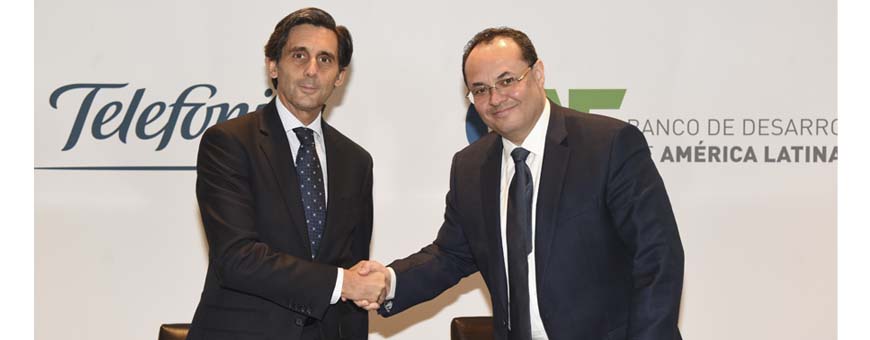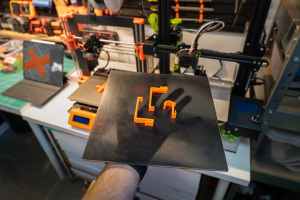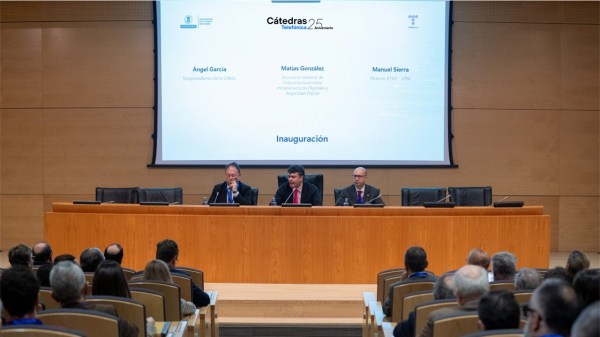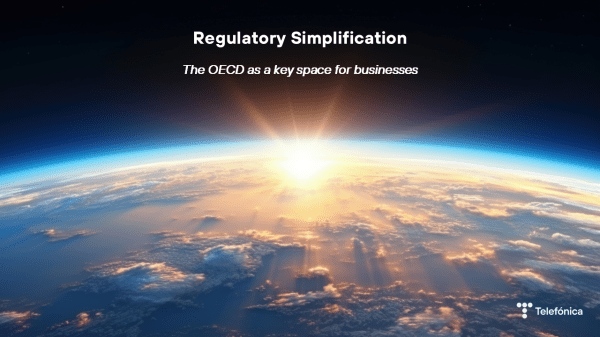RELATED POSTS
- José María Álvarez-Pallete, Chairman & CEO of Telefónica, and Luis Carranza, Executive President of CAF -development bank of Latin America-, have signed an agreement for strategic collaboration between the two entities.
- The alliance, which will be in force until October 2020, is based on three initial lines of action: Internet for all, Economy and Digital Transformation for inclusive development; and Institutional cooperation and sharing knowledge.

José María Álvarez-Pallete and Luis Carranza
José María Álvarez-Pallete, Chairman of Telefónica, and Luis Carranza, President of CAF (development bank of Latin America) have reached a strategic collaboration agreement so that the two entities can work together to promote programs, projects and initiatives aimed at developing digitalization in the Latin American countries in which they both operate.
This alliance has an initial applicability of three years (October 2017-October 2020), and it opens up a framework of institutional collaboration to promote the programs and projects that are already being developed individually or together with other public-private entities. At the same time, it promotes new joint initiatives that will be defined that effectively contribute to the economic and social development of countries in the region.
The Chairman of Telefónica, José María Álvarez-Pallete, was delighted to have CAF as a strategic ally in developing investment and digitalization in Latin America: “This agreement is a clear example of the type of public-private alliances that are key for the Latin American region to take a qualitative step forward, by encouraging investment in development and digital transformation projects. With this agreement, Telefónica and CAF become strategic allies for this type of projects.”
As part of this framework, three strategic lines of action have been defined that will be developed through specific projects. First of all, the alliance places emphasis on “Internet for all”. This involves the development and support for initiatives that accelerate Internet connections in disconnected communities and areas of Latin America, as well as those that already have basic telecommunications services.
Secondly, the participants will promote digital transformation projects that place new technologies at the service of inclusive economic and social development, promoting the digitalization of cities, entrepreneurship and technological and social development, including areas of gender equality, education and health.
Along these lines, one of the specific projects involves transforming the productive structure of Latin America through actions that help to accelerate the intensive use of digital technologies in the production processes of the industrial fabric of the region.
Finally, the third line of action established focuses on actions for institutional cooperation and sharing knowledge through the joint development of studies, reports and organized activities for and on Latin America in the institutional environment between Spain and Latin America.
After signing the agreement, Luis Carranza, Executive President of CAF, placed special emphasis on the importance of having Telefónica as a strategic ally to “promote the productive transformation of Latin American, through programs that encourage innovation, investigation and the use of new technologies, essential factors for sustainable development and regional integration.”
This initiative is part of Telefónica’s commitment to promote digitalisation in Latin America, through alliances with entities dedicated to development in the continent. This is the case of the agreement renewed at the beginning of 2017 by Telefónica and the Inter-American Development Bank (IDB) or the ICT 2030 Alliance for the Americas, signed last year between OAS, Telefónica Foundation and the main ICT companies in Latin America.






